Healthcare Essay: Eating Behavior, Appetite, and Endocrine System
VerifiedAdded on 2023/04/20
|9
|3774
|114
Essay
AI Summary
This essay delves into the multi-disciplinary nature of eating behavior and appetite, exploring various themes that influence an individual's eating habits. It examines the roles of the brain, gut, and hormones, including insulin, leptin, and ghrelin, in regulating appetite and satiety. The essay further discusses the impact of environmental, cognitive, social, psychological, and consumerist factors, including media and body image, on eating behavior. A significant portion of the essay focuses on the satiety cascade and the endocrine system, explaining how these systems affect eating behavior. The essay emphasizes the importance of understanding these factors to address issues related to food intake and overall health. The essay also explains the role of the endocrine system in influencing the eating behavior of an individual.

Running Head: HEALTHCARE
0
Healthcare
2/14/2019
0
Healthcare
2/14/2019
Paraphrase This Document
Need a fresh take? Get an instant paraphrase of this document with our AI Paraphraser
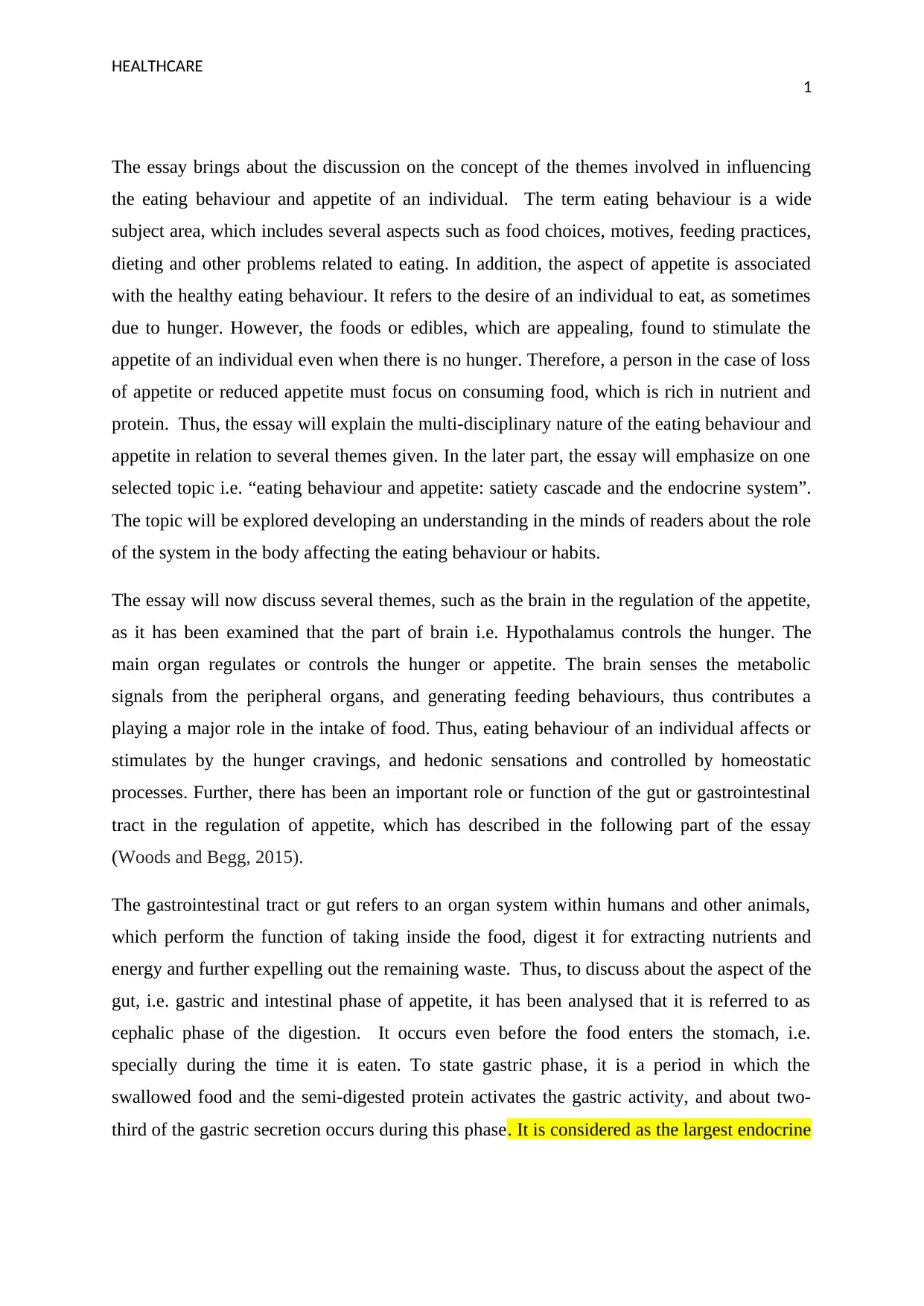
HEALTHCARE
1
The essay brings about the discussion on the concept of the themes involved in influencing
the eating behaviour and appetite of an individual. The term eating behaviour is a wide
subject area, which includes several aspects such as food choices, motives, feeding practices,
dieting and other problems related to eating. In addition, the aspect of appetite is associated
with the healthy eating behaviour. It refers to the desire of an individual to eat, as sometimes
due to hunger. However, the foods or edibles, which are appealing, found to stimulate the
appetite of an individual even when there is no hunger. Therefore, a person in the case of loss
of appetite or reduced appetite must focus on consuming food, which is rich in nutrient and
protein. Thus, the essay will explain the multi-disciplinary nature of the eating behaviour and
appetite in relation to several themes given. In the later part, the essay will emphasize on one
selected topic i.e. “eating behaviour and appetite: satiety cascade and the endocrine system”.
The topic will be explored developing an understanding in the minds of readers about the role
of the system in the body affecting the eating behaviour or habits.
The essay will now discuss several themes, such as the brain in the regulation of the appetite,
as it has been examined that the part of brain i.e. Hypothalamus controls the hunger. The
main organ regulates or controls the hunger or appetite. The brain senses the metabolic
signals from the peripheral organs, and generating feeding behaviours, thus contributes a
playing a major role in the intake of food. Thus, eating behaviour of an individual affects or
stimulates by the hunger cravings, and hedonic sensations and controlled by homeostatic
processes. Further, there has been an important role or function of the gut or gastrointestinal
tract in the regulation of appetite, which has described in the following part of the essay
(Woods and Begg, 2015).
The gastrointestinal tract or gut refers to an organ system within humans and other animals,
which perform the function of taking inside the food, digest it for extracting nutrients and
energy and further expelling out the remaining waste. Thus, to discuss about the aspect of the
gut, i.e. gastric and intestinal phase of appetite, it has been analysed that it is referred to as
cephalic phase of the digestion. It occurs even before the food enters the stomach, i.e.
specially during the time it is eaten. To state gastric phase, it is a period in which the
swallowed food and the semi-digested protein activates the gastric activity, and about two-
third of the gastric secretion occurs during this phase. It is considered as the largest endocrine
1
The essay brings about the discussion on the concept of the themes involved in influencing
the eating behaviour and appetite of an individual. The term eating behaviour is a wide
subject area, which includes several aspects such as food choices, motives, feeding practices,
dieting and other problems related to eating. In addition, the aspect of appetite is associated
with the healthy eating behaviour. It refers to the desire of an individual to eat, as sometimes
due to hunger. However, the foods or edibles, which are appealing, found to stimulate the
appetite of an individual even when there is no hunger. Therefore, a person in the case of loss
of appetite or reduced appetite must focus on consuming food, which is rich in nutrient and
protein. Thus, the essay will explain the multi-disciplinary nature of the eating behaviour and
appetite in relation to several themes given. In the later part, the essay will emphasize on one
selected topic i.e. “eating behaviour and appetite: satiety cascade and the endocrine system”.
The topic will be explored developing an understanding in the minds of readers about the role
of the system in the body affecting the eating behaviour or habits.
The essay will now discuss several themes, such as the brain in the regulation of the appetite,
as it has been examined that the part of brain i.e. Hypothalamus controls the hunger. The
main organ regulates or controls the hunger or appetite. The brain senses the metabolic
signals from the peripheral organs, and generating feeding behaviours, thus contributes a
playing a major role in the intake of food. Thus, eating behaviour of an individual affects or
stimulates by the hunger cravings, and hedonic sensations and controlled by homeostatic
processes. Further, there has been an important role or function of the gut or gastrointestinal
tract in the regulation of appetite, which has described in the following part of the essay
(Woods and Begg, 2015).
The gastrointestinal tract or gut refers to an organ system within humans and other animals,
which perform the function of taking inside the food, digest it for extracting nutrients and
energy and further expelling out the remaining waste. Thus, to discuss about the aspect of the
gut, i.e. gastric and intestinal phase of appetite, it has been analysed that it is referred to as
cephalic phase of the digestion. It occurs even before the food enters the stomach, i.e.
specially during the time it is eaten. To state gastric phase, it is a period in which the
swallowed food and the semi-digested protein activates the gastric activity, and about two-
third of the gastric secretion occurs during this phase. It is considered as the largest endocrine
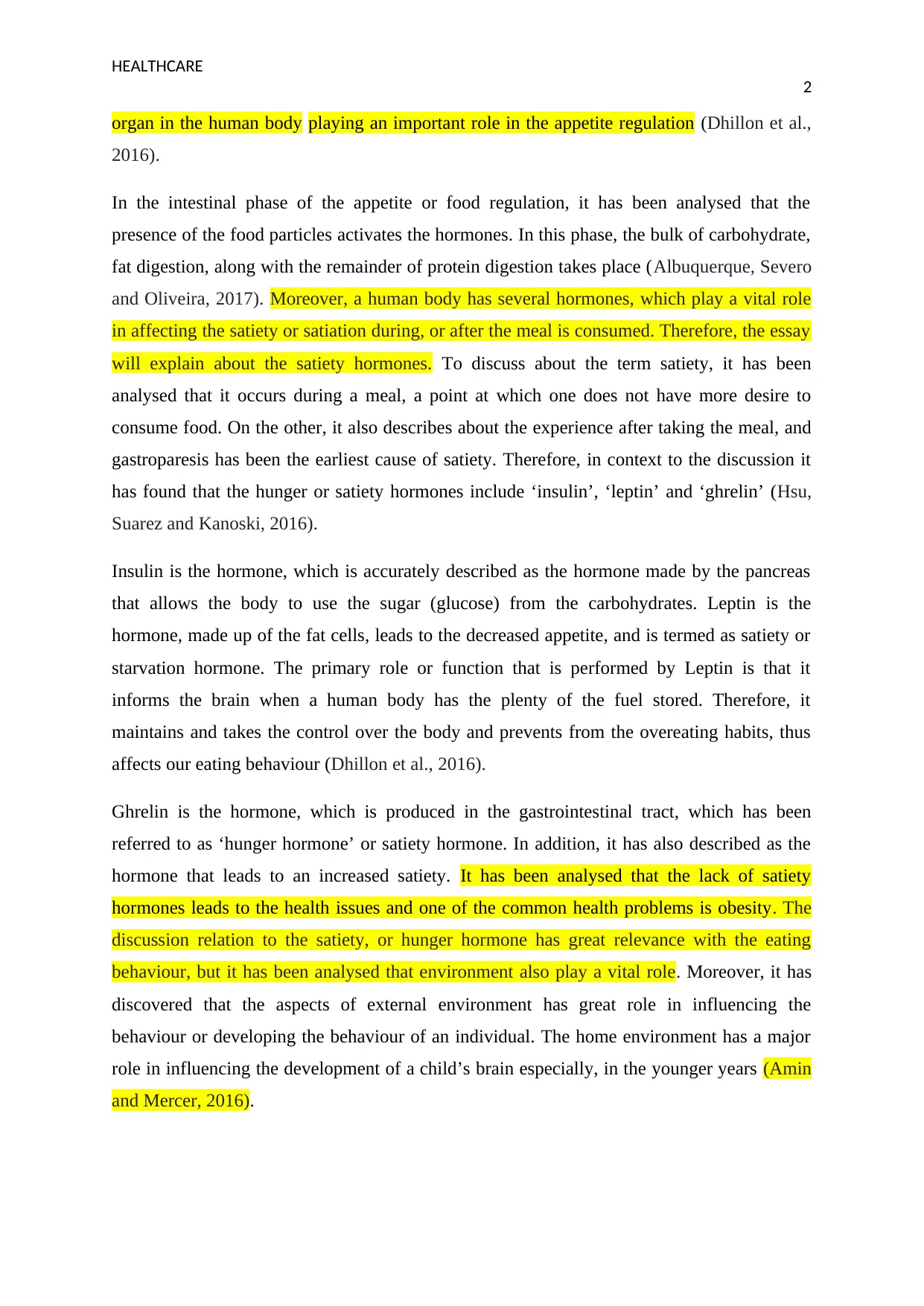
HEALTHCARE
2
organ in the human body playing an important role in the appetite regulation (Dhillon et al.,
2016).
In the intestinal phase of the appetite or food regulation, it has been analysed that the
presence of the food particles activates the hormones. In this phase, the bulk of carbohydrate,
fat digestion, along with the remainder of protein digestion takes place (Albuquerque, Severo
and Oliveira, 2017). Moreover, a human body has several hormones, which play a vital role
in affecting the satiety or satiation during, or after the meal is consumed. Therefore, the essay
will explain about the satiety hormones. To discuss about the term satiety, it has been
analysed that it occurs during a meal, a point at which one does not have more desire to
consume food. On the other, it also describes about the experience after taking the meal, and
gastroparesis has been the earliest cause of satiety. Therefore, in context to the discussion it
has found that the hunger or satiety hormones include ‘insulin’, ‘leptin’ and ‘ghrelin’ (Hsu,
Suarez and Kanoski, 2016).
Insulin is the hormone, which is accurately described as the hormone made by the pancreas
that allows the body to use the sugar (glucose) from the carbohydrates. Leptin is the
hormone, made up of the fat cells, leads to the decreased appetite, and is termed as satiety or
starvation hormone. The primary role or function that is performed by Leptin is that it
informs the brain when a human body has the plenty of the fuel stored. Therefore, it
maintains and takes the control over the body and prevents from the overeating habits, thus
affects our eating behaviour (Dhillon et al., 2016).
Ghrelin is the hormone, which is produced in the gastrointestinal tract, which has been
referred to as ‘hunger hormone’ or satiety hormone. In addition, it has also described as the
hormone that leads to an increased satiety. It has been analysed that the lack of satiety
hormones leads to the health issues and one of the common health problems is obesity. The
discussion relation to the satiety, or hunger hormone has great relevance with the eating
behaviour, but it has been analysed that environment also play a vital role. Moreover, it has
discovered that the aspects of external environment has great role in influencing the
behaviour or developing the behaviour of an individual. The home environment has a major
role in influencing the development of a child’s brain especially, in the younger years (Amin
and Mercer, 2016).
2
organ in the human body playing an important role in the appetite regulation (Dhillon et al.,
2016).
In the intestinal phase of the appetite or food regulation, it has been analysed that the
presence of the food particles activates the hormones. In this phase, the bulk of carbohydrate,
fat digestion, along with the remainder of protein digestion takes place (Albuquerque, Severo
and Oliveira, 2017). Moreover, a human body has several hormones, which play a vital role
in affecting the satiety or satiation during, or after the meal is consumed. Therefore, the essay
will explain about the satiety hormones. To discuss about the term satiety, it has been
analysed that it occurs during a meal, a point at which one does not have more desire to
consume food. On the other, it also describes about the experience after taking the meal, and
gastroparesis has been the earliest cause of satiety. Therefore, in context to the discussion it
has found that the hunger or satiety hormones include ‘insulin’, ‘leptin’ and ‘ghrelin’ (Hsu,
Suarez and Kanoski, 2016).
Insulin is the hormone, which is accurately described as the hormone made by the pancreas
that allows the body to use the sugar (glucose) from the carbohydrates. Leptin is the
hormone, made up of the fat cells, leads to the decreased appetite, and is termed as satiety or
starvation hormone. The primary role or function that is performed by Leptin is that it
informs the brain when a human body has the plenty of the fuel stored. Therefore, it
maintains and takes the control over the body and prevents from the overeating habits, thus
affects our eating behaviour (Dhillon et al., 2016).
Ghrelin is the hormone, which is produced in the gastrointestinal tract, which has been
referred to as ‘hunger hormone’ or satiety hormone. In addition, it has also described as the
hormone that leads to an increased satiety. It has been analysed that the lack of satiety
hormones leads to the health issues and one of the common health problems is obesity. The
discussion relation to the satiety, or hunger hormone has great relevance with the eating
behaviour, but it has been analysed that environment also play a vital role. Moreover, it has
discovered that the aspects of external environment has great role in influencing the
behaviour or developing the behaviour of an individual. The home environment has a major
role in influencing the development of a child’s brain especially, in the younger years (Amin
and Mercer, 2016).
⊘ This is a preview!⊘
Do you want full access?
Subscribe today to unlock all pages.

Trusted by 1+ million students worldwide
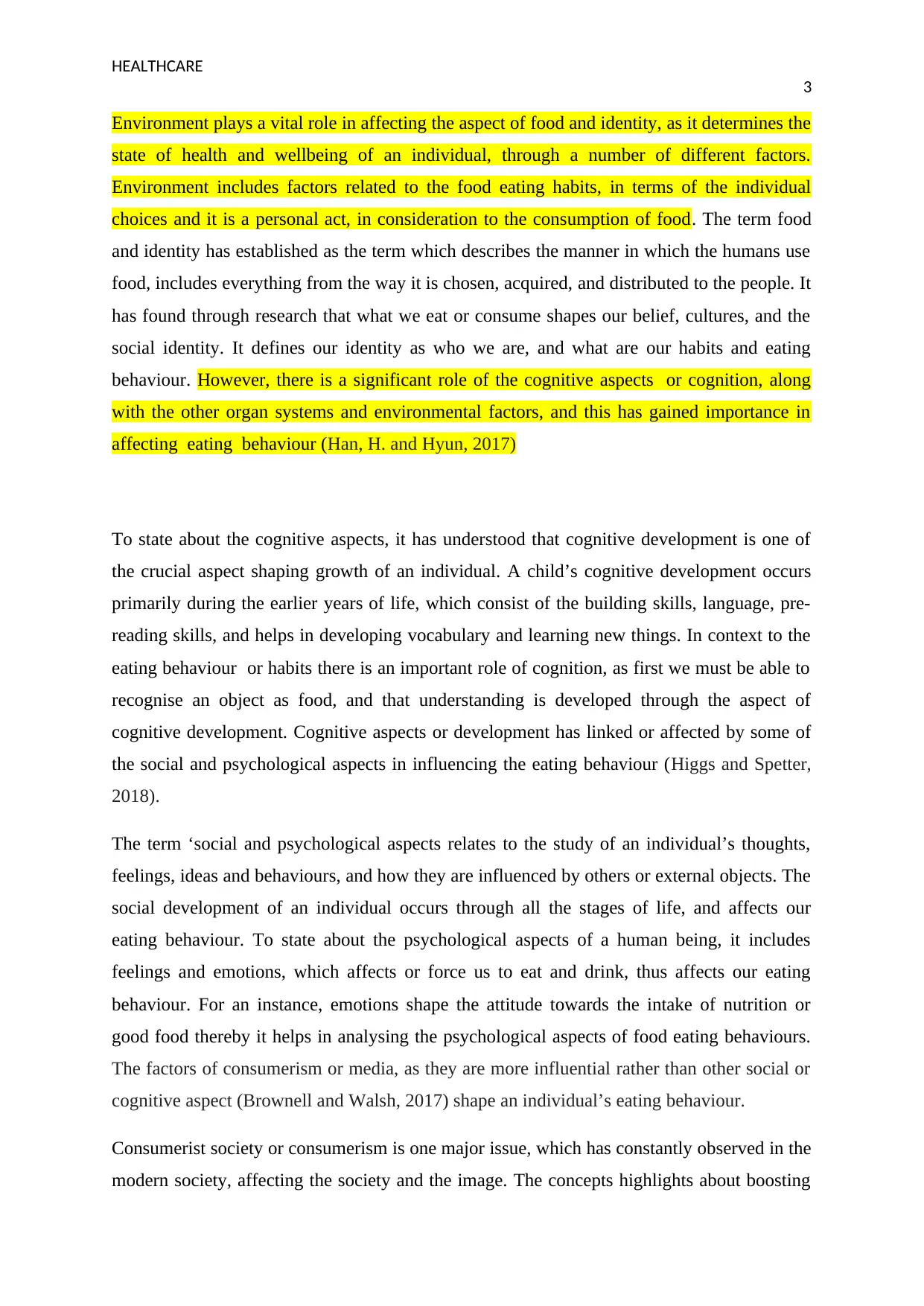
HEALTHCARE
3
Environment plays a vital role in affecting the aspect of food and identity, as it determines the
state of health and wellbeing of an individual, through a number of different factors.
Environment includes factors related to the food eating habits, in terms of the individual
choices and it is a personal act, in consideration to the consumption of food. The term food
and identity has established as the term which describes the manner in which the humans use
food, includes everything from the way it is chosen, acquired, and distributed to the people. It
has found through research that what we eat or consume shapes our belief, cultures, and the
social identity. It defines our identity as who we are, and what are our habits and eating
behaviour. However, there is a significant role of the cognitive aspects or cognition, along
with the other organ systems and environmental factors, and this has gained importance in
affecting eating behaviour (Han, H. and Hyun, 2017)
To state about the cognitive aspects, it has understood that cognitive development is one of
the crucial aspect shaping growth of an individual. A child’s cognitive development occurs
primarily during the earlier years of life, which consist of the building skills, language, pre-
reading skills, and helps in developing vocabulary and learning new things. In context to the
eating behaviour or habits there is an important role of cognition, as first we must be able to
recognise an object as food, and that understanding is developed through the aspect of
cognitive development. Cognitive aspects or development has linked or affected by some of
the social and psychological aspects in influencing the eating behaviour (Higgs and Spetter,
2018).
The term ‘social and psychological aspects relates to the study of an individual’s thoughts,
feelings, ideas and behaviours, and how they are influenced by others or external objects. The
social development of an individual occurs through all the stages of life, and affects our
eating behaviour. To state about the psychological aspects of a human being, it includes
feelings and emotions, which affects or force us to eat and drink, thus affects our eating
behaviour. For an instance, emotions shape the attitude towards the intake of nutrition or
good food thereby it helps in analysing the psychological aspects of food eating behaviours.
The factors of consumerism or media, as they are more influential rather than other social or
cognitive aspect (Brownell and Walsh, 2017) shape an individual’s eating behaviour.
Consumerist society or consumerism is one major issue, which has constantly observed in the
modern society, affecting the society and the image. The concepts highlights about boosting
3
Environment plays a vital role in affecting the aspect of food and identity, as it determines the
state of health and wellbeing of an individual, through a number of different factors.
Environment includes factors related to the food eating habits, in terms of the individual
choices and it is a personal act, in consideration to the consumption of food. The term food
and identity has established as the term which describes the manner in which the humans use
food, includes everything from the way it is chosen, acquired, and distributed to the people. It
has found through research that what we eat or consume shapes our belief, cultures, and the
social identity. It defines our identity as who we are, and what are our habits and eating
behaviour. However, there is a significant role of the cognitive aspects or cognition, along
with the other organ systems and environmental factors, and this has gained importance in
affecting eating behaviour (Han, H. and Hyun, 2017)
To state about the cognitive aspects, it has understood that cognitive development is one of
the crucial aspect shaping growth of an individual. A child’s cognitive development occurs
primarily during the earlier years of life, which consist of the building skills, language, pre-
reading skills, and helps in developing vocabulary and learning new things. In context to the
eating behaviour or habits there is an important role of cognition, as first we must be able to
recognise an object as food, and that understanding is developed through the aspect of
cognitive development. Cognitive aspects or development has linked or affected by some of
the social and psychological aspects in influencing the eating behaviour (Higgs and Spetter,
2018).
The term ‘social and psychological aspects relates to the study of an individual’s thoughts,
feelings, ideas and behaviours, and how they are influenced by others or external objects. The
social development of an individual occurs through all the stages of life, and affects our
eating behaviour. To state about the psychological aspects of a human being, it includes
feelings and emotions, which affects or force us to eat and drink, thus affects our eating
behaviour. For an instance, emotions shape the attitude towards the intake of nutrition or
good food thereby it helps in analysing the psychological aspects of food eating behaviours.
The factors of consumerism or media, as they are more influential rather than other social or
cognitive aspect (Brownell and Walsh, 2017) shape an individual’s eating behaviour.
Consumerist society or consumerism is one major issue, which has constantly observed in the
modern society, affecting the society and the image. The concepts highlights about boosting
Paraphrase This Document
Need a fresh take? Get an instant paraphrase of this document with our AI Paraphraser
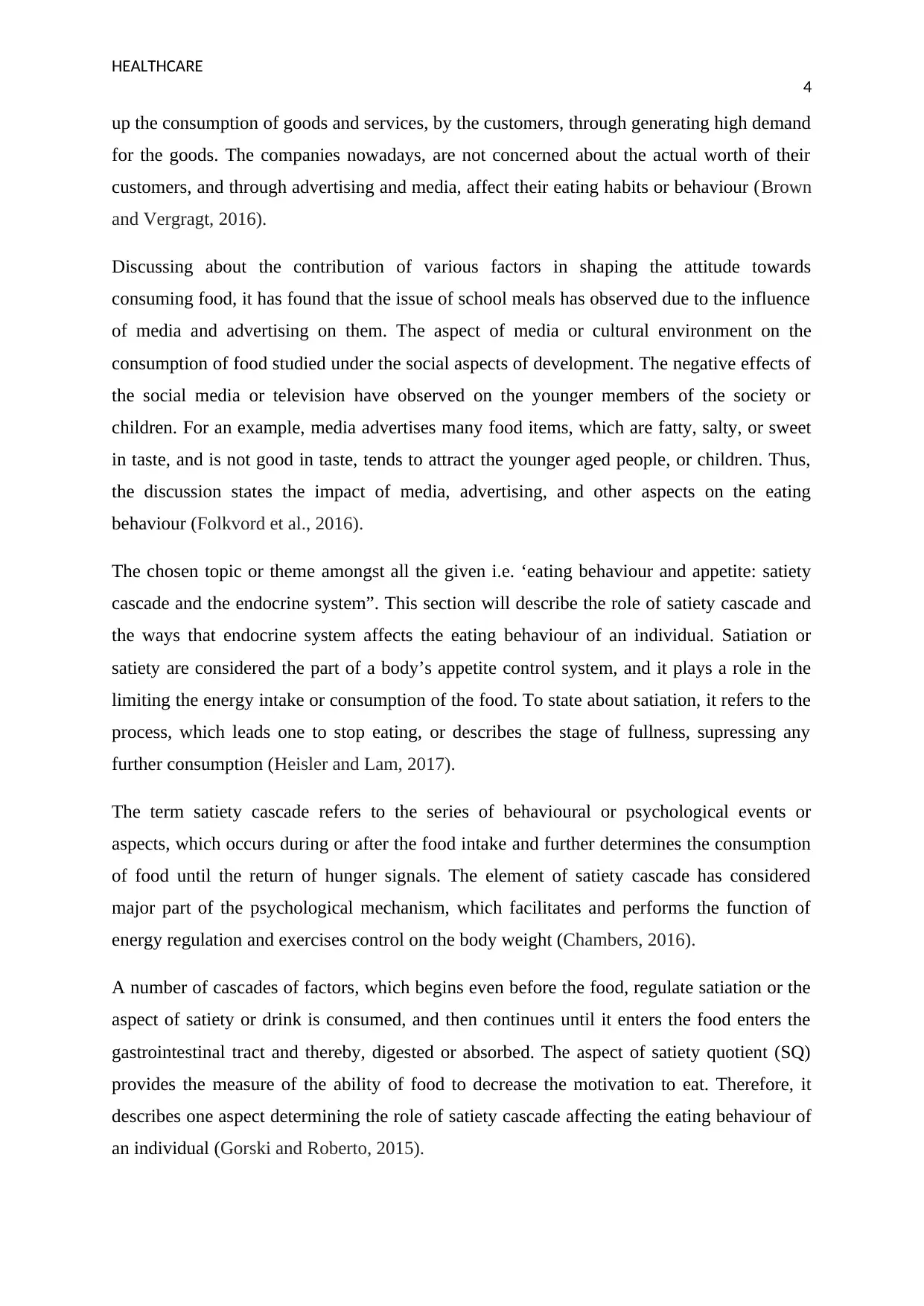
HEALTHCARE
4
up the consumption of goods and services, by the customers, through generating high demand
for the goods. The companies nowadays, are not concerned about the actual worth of their
customers, and through advertising and media, affect their eating habits or behaviour (Brown
and Vergragt, 2016).
Discussing about the contribution of various factors in shaping the attitude towards
consuming food, it has found that the issue of school meals has observed due to the influence
of media and advertising on them. The aspect of media or cultural environment on the
consumption of food studied under the social aspects of development. The negative effects of
the social media or television have observed on the younger members of the society or
children. For an example, media advertises many food items, which are fatty, salty, or sweet
in taste, and is not good in taste, tends to attract the younger aged people, or children. Thus,
the discussion states the impact of media, advertising, and other aspects on the eating
behaviour (Folkvord et al., 2016).
The chosen topic or theme amongst all the given i.e. ‘eating behaviour and appetite: satiety
cascade and the endocrine system”. This section will describe the role of satiety cascade and
the ways that endocrine system affects the eating behaviour of an individual. Satiation or
satiety are considered the part of a body’s appetite control system, and it plays a role in the
limiting the energy intake or consumption of the food. To state about satiation, it refers to the
process, which leads one to stop eating, or describes the stage of fullness, supressing any
further consumption (Heisler and Lam, 2017).
The term satiety cascade refers to the series of behavioural or psychological events or
aspects, which occurs during or after the food intake and further determines the consumption
of food until the return of hunger signals. The element of satiety cascade has considered
major part of the psychological mechanism, which facilitates and performs the function of
energy regulation and exercises control on the body weight (Chambers, 2016).
A number of cascades of factors, which begins even before the food, regulate satiation or the
aspect of satiety or drink is consumed, and then continues until it enters the food enters the
gastrointestinal tract and thereby, digested or absorbed. The aspect of satiety quotient (SQ)
provides the measure of the ability of food to decrease the motivation to eat. Therefore, it
describes one aspect determining the role of satiety cascade affecting the eating behaviour of
an individual (Gorski and Roberto, 2015).
4
up the consumption of goods and services, by the customers, through generating high demand
for the goods. The companies nowadays, are not concerned about the actual worth of their
customers, and through advertising and media, affect their eating habits or behaviour (Brown
and Vergragt, 2016).
Discussing about the contribution of various factors in shaping the attitude towards
consuming food, it has found that the issue of school meals has observed due to the influence
of media and advertising on them. The aspect of media or cultural environment on the
consumption of food studied under the social aspects of development. The negative effects of
the social media or television have observed on the younger members of the society or
children. For an example, media advertises many food items, which are fatty, salty, or sweet
in taste, and is not good in taste, tends to attract the younger aged people, or children. Thus,
the discussion states the impact of media, advertising, and other aspects on the eating
behaviour (Folkvord et al., 2016).
The chosen topic or theme amongst all the given i.e. ‘eating behaviour and appetite: satiety
cascade and the endocrine system”. This section will describe the role of satiety cascade and
the ways that endocrine system affects the eating behaviour of an individual. Satiation or
satiety are considered the part of a body’s appetite control system, and it plays a role in the
limiting the energy intake or consumption of the food. To state about satiation, it refers to the
process, which leads one to stop eating, or describes the stage of fullness, supressing any
further consumption (Heisler and Lam, 2017).
The term satiety cascade refers to the series of behavioural or psychological events or
aspects, which occurs during or after the food intake and further determines the consumption
of food until the return of hunger signals. The element of satiety cascade has considered
major part of the psychological mechanism, which facilitates and performs the function of
energy regulation and exercises control on the body weight (Chambers, 2016).
A number of cascades of factors, which begins even before the food, regulate satiation or the
aspect of satiety or drink is consumed, and then continues until it enters the food enters the
gastrointestinal tract and thereby, digested or absorbed. The aspect of satiety quotient (SQ)
provides the measure of the ability of food to decrease the motivation to eat. Therefore, it
describes one aspect determining the role of satiety cascade affecting the eating behaviour of
an individual (Gorski and Roberto, 2015).
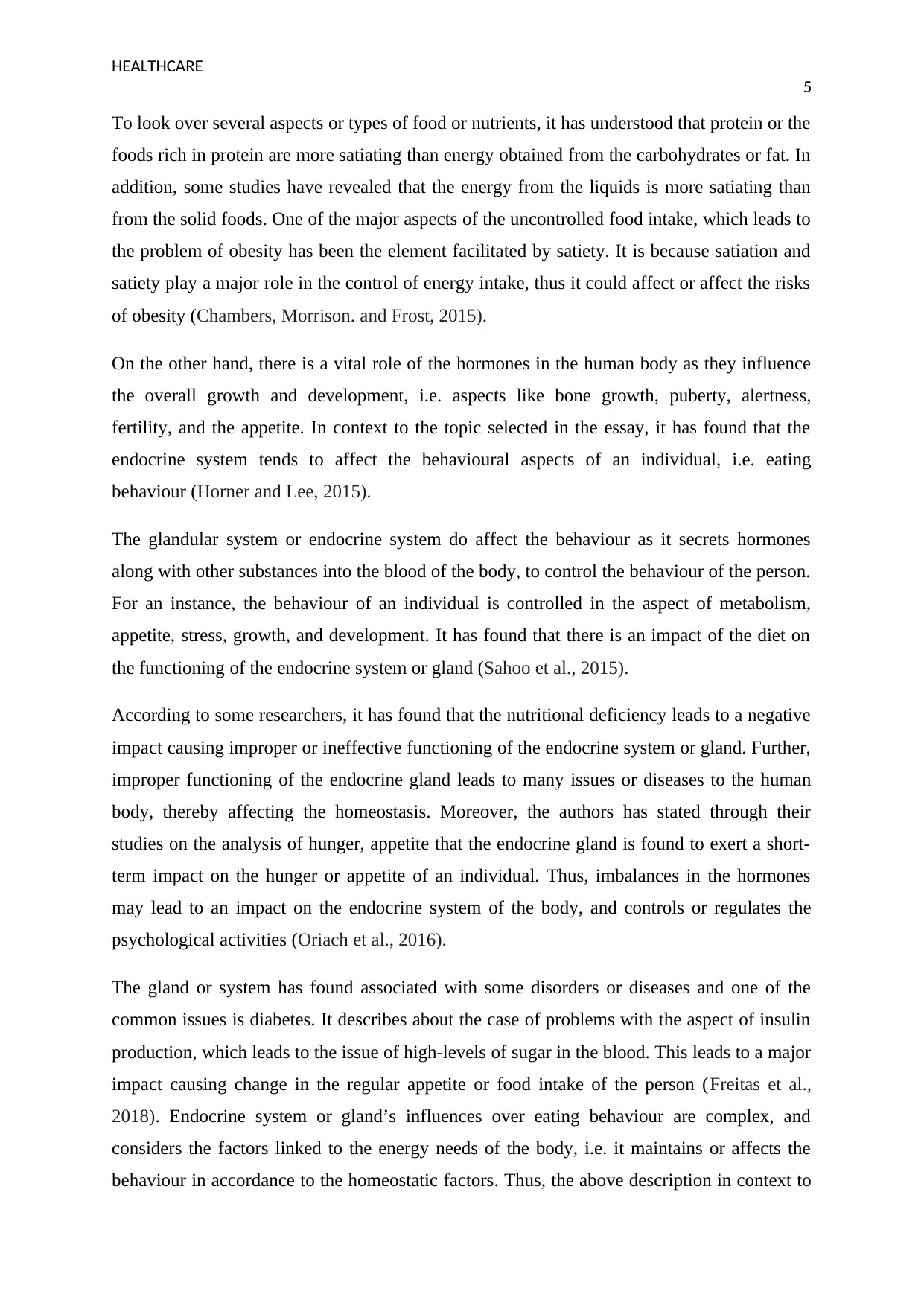
HEALTHCARE
5
To look over several aspects or types of food or nutrients, it has understood that protein or the
foods rich in protein are more satiating than energy obtained from the carbohydrates or fat. In
addition, some studies have revealed that the energy from the liquids is more satiating than
from the solid foods. One of the major aspects of the uncontrolled food intake, which leads to
the problem of obesity has been the element facilitated by satiety. It is because satiation and
satiety play a major role in the control of energy intake, thus it could affect or affect the risks
of obesity (Chambers, Morrison. and Frost, 2015).
On the other hand, there is a vital role of the hormones in the human body as they influence
the overall growth and development, i.e. aspects like bone growth, puberty, alertness,
fertility, and the appetite. In context to the topic selected in the essay, it has found that the
endocrine system tends to affect the behavioural aspects of an individual, i.e. eating
behaviour (Horner and Lee, 2015).
The glandular system or endocrine system do affect the behaviour as it secrets hormones
along with other substances into the blood of the body, to control the behaviour of the person.
For an instance, the behaviour of an individual is controlled in the aspect of metabolism,
appetite, stress, growth, and development. It has found that there is an impact of the diet on
the functioning of the endocrine system or gland (Sahoo et al., 2015).
According to some researchers, it has found that the nutritional deficiency leads to a negative
impact causing improper or ineffective functioning of the endocrine system or gland. Further,
improper functioning of the endocrine gland leads to many issues or diseases to the human
body, thereby affecting the homeostasis. Moreover, the authors has stated through their
studies on the analysis of hunger, appetite that the endocrine gland is found to exert a short-
term impact on the hunger or appetite of an individual. Thus, imbalances in the hormones
may lead to an impact on the endocrine system of the body, and controls or regulates the
psychological activities (Oriach et al., 2016).
The gland or system has found associated with some disorders or diseases and one of the
common issues is diabetes. It describes about the case of problems with the aspect of insulin
production, which leads to the issue of high-levels of sugar in the blood. This leads to a major
impact causing change in the regular appetite or food intake of the person (Freitas et al.,
2018). Endocrine system or gland’s influences over eating behaviour are complex, and
considers the factors linked to the energy needs of the body, i.e. it maintains or affects the
behaviour in accordance to the homeostatic factors. Thus, the above description in context to
5
To look over several aspects or types of food or nutrients, it has understood that protein or the
foods rich in protein are more satiating than energy obtained from the carbohydrates or fat. In
addition, some studies have revealed that the energy from the liquids is more satiating than
from the solid foods. One of the major aspects of the uncontrolled food intake, which leads to
the problem of obesity has been the element facilitated by satiety. It is because satiation and
satiety play a major role in the control of energy intake, thus it could affect or affect the risks
of obesity (Chambers, Morrison. and Frost, 2015).
On the other hand, there is a vital role of the hormones in the human body as they influence
the overall growth and development, i.e. aspects like bone growth, puberty, alertness,
fertility, and the appetite. In context to the topic selected in the essay, it has found that the
endocrine system tends to affect the behavioural aspects of an individual, i.e. eating
behaviour (Horner and Lee, 2015).
The glandular system or endocrine system do affect the behaviour as it secrets hormones
along with other substances into the blood of the body, to control the behaviour of the person.
For an instance, the behaviour of an individual is controlled in the aspect of metabolism,
appetite, stress, growth, and development. It has found that there is an impact of the diet on
the functioning of the endocrine system or gland (Sahoo et al., 2015).
According to some researchers, it has found that the nutritional deficiency leads to a negative
impact causing improper or ineffective functioning of the endocrine system or gland. Further,
improper functioning of the endocrine gland leads to many issues or diseases to the human
body, thereby affecting the homeostasis. Moreover, the authors has stated through their
studies on the analysis of hunger, appetite that the endocrine gland is found to exert a short-
term impact on the hunger or appetite of an individual. Thus, imbalances in the hormones
may lead to an impact on the endocrine system of the body, and controls or regulates the
psychological activities (Oriach et al., 2016).
The gland or system has found associated with some disorders or diseases and one of the
common issues is diabetes. It describes about the case of problems with the aspect of insulin
production, which leads to the issue of high-levels of sugar in the blood. This leads to a major
impact causing change in the regular appetite or food intake of the person (Freitas et al.,
2018). Endocrine system or gland’s influences over eating behaviour are complex, and
considers the factors linked to the energy needs of the body, i.e. it maintains or affects the
behaviour in accordance to the homeostatic factors. Thus, the above description in context to
⊘ This is a preview!⊘
Do you want full access?
Subscribe today to unlock all pages.

Trusted by 1+ million students worldwide
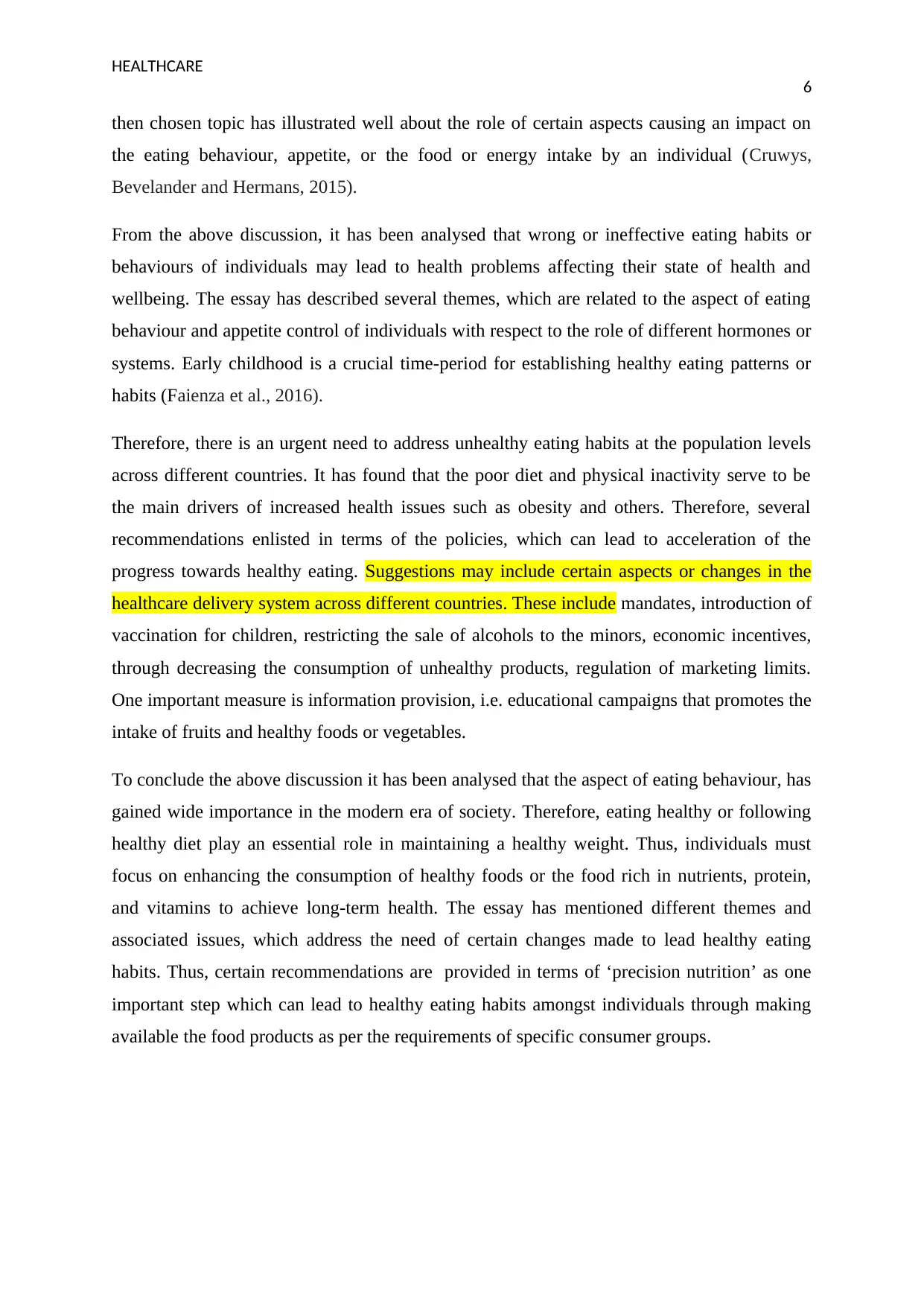
HEALTHCARE
6
then chosen topic has illustrated well about the role of certain aspects causing an impact on
the eating behaviour, appetite, or the food or energy intake by an individual (Cruwys,
Bevelander and Hermans, 2015).
From the above discussion, it has been analysed that wrong or ineffective eating habits or
behaviours of individuals may lead to health problems affecting their state of health and
wellbeing. The essay has described several themes, which are related to the aspect of eating
behaviour and appetite control of individuals with respect to the role of different hormones or
systems. Early childhood is a crucial time-period for establishing healthy eating patterns or
habits (Faienza et al., 2016).
Therefore, there is an urgent need to address unhealthy eating habits at the population levels
across different countries. It has found that the poor diet and physical inactivity serve to be
the main drivers of increased health issues such as obesity and others. Therefore, several
recommendations enlisted in terms of the policies, which can lead to acceleration of the
progress towards healthy eating. Suggestions may include certain aspects or changes in the
healthcare delivery system across different countries. These include mandates, introduction of
vaccination for children, restricting the sale of alcohols to the minors, economic incentives,
through decreasing the consumption of unhealthy products, regulation of marketing limits.
One important measure is information provision, i.e. educational campaigns that promotes the
intake of fruits and healthy foods or vegetables.
To conclude the above discussion it has been analysed that the aspect of eating behaviour, has
gained wide importance in the modern era of society. Therefore, eating healthy or following
healthy diet play an essential role in maintaining a healthy weight. Thus, individuals must
focus on enhancing the consumption of healthy foods or the food rich in nutrients, protein,
and vitamins to achieve long-term health. The essay has mentioned different themes and
associated issues, which address the need of certain changes made to lead healthy eating
habits. Thus, certain recommendations are provided in terms of ‘precision nutrition’ as one
important step which can lead to healthy eating habits amongst individuals through making
available the food products as per the requirements of specific consumer groups.
6
then chosen topic has illustrated well about the role of certain aspects causing an impact on
the eating behaviour, appetite, or the food or energy intake by an individual (Cruwys,
Bevelander and Hermans, 2015).
From the above discussion, it has been analysed that wrong or ineffective eating habits or
behaviours of individuals may lead to health problems affecting their state of health and
wellbeing. The essay has described several themes, which are related to the aspect of eating
behaviour and appetite control of individuals with respect to the role of different hormones or
systems. Early childhood is a crucial time-period for establishing healthy eating patterns or
habits (Faienza et al., 2016).
Therefore, there is an urgent need to address unhealthy eating habits at the population levels
across different countries. It has found that the poor diet and physical inactivity serve to be
the main drivers of increased health issues such as obesity and others. Therefore, several
recommendations enlisted in terms of the policies, which can lead to acceleration of the
progress towards healthy eating. Suggestions may include certain aspects or changes in the
healthcare delivery system across different countries. These include mandates, introduction of
vaccination for children, restricting the sale of alcohols to the minors, economic incentives,
through decreasing the consumption of unhealthy products, regulation of marketing limits.
One important measure is information provision, i.e. educational campaigns that promotes the
intake of fruits and healthy foods or vegetables.
To conclude the above discussion it has been analysed that the aspect of eating behaviour, has
gained wide importance in the modern era of society. Therefore, eating healthy or following
healthy diet play an essential role in maintaining a healthy weight. Thus, individuals must
focus on enhancing the consumption of healthy foods or the food rich in nutrients, protein,
and vitamins to achieve long-term health. The essay has mentioned different themes and
associated issues, which address the need of certain changes made to lead healthy eating
habits. Thus, certain recommendations are provided in terms of ‘precision nutrition’ as one
important step which can lead to healthy eating habits amongst individuals through making
available the food products as per the requirements of specific consumer groups.
Paraphrase This Document
Need a fresh take? Get an instant paraphrase of this document with our AI Paraphraser
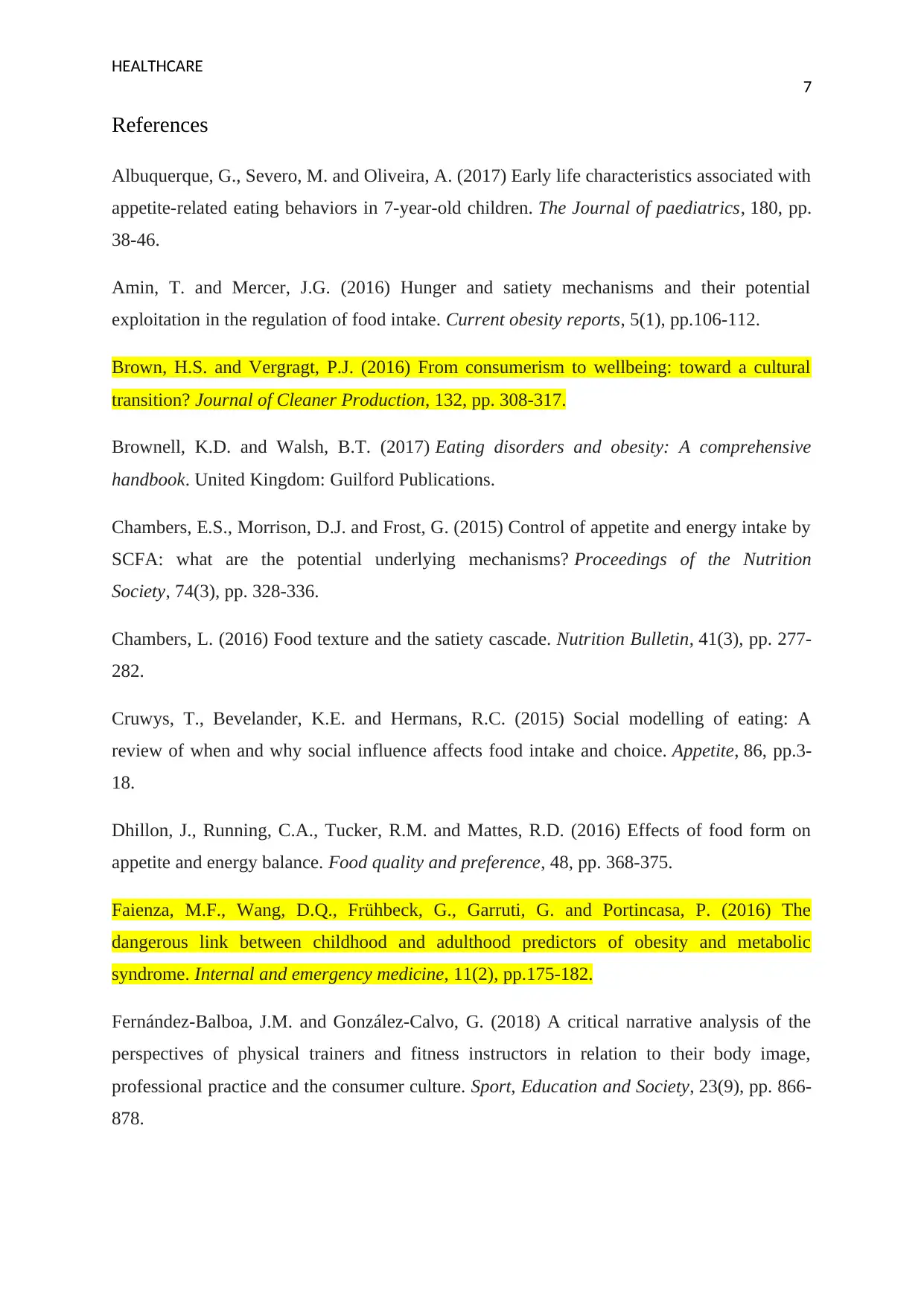
HEALTHCARE
7
References
Albuquerque, G., Severo, M. and Oliveira, A. (2017) Early life characteristics associated with
appetite-related eating behaviors in 7-year-old children. The Journal of paediatrics, 180, pp.
38-46.
Amin, T. and Mercer, J.G. (2016) Hunger and satiety mechanisms and their potential
exploitation in the regulation of food intake. Current obesity reports, 5(1), pp.106-112.
Brown, H.S. and Vergragt, P.J. (2016) From consumerism to wellbeing: toward a cultural
transition? Journal of Cleaner Production, 132, pp. 308-317.
Brownell, K.D. and Walsh, B.T. (2017) Eating disorders and obesity: A comprehensive
handbook. United Kingdom: Guilford Publications.
Chambers, E.S., Morrison, D.J. and Frost, G. (2015) Control of appetite and energy intake by
SCFA: what are the potential underlying mechanisms? Proceedings of the Nutrition
Society, 74(3), pp. 328-336.
Chambers, L. (2016) Food texture and the satiety cascade. Nutrition Bulletin, 41(3), pp. 277-
282.
Cruwys, T., Bevelander, K.E. and Hermans, R.C. (2015) Social modelling of eating: A
review of when and why social influence affects food intake and choice. Appetite, 86, pp.3-
18.
Dhillon, J., Running, C.A., Tucker, R.M. and Mattes, R.D. (2016) Effects of food form on
appetite and energy balance. Food quality and preference, 48, pp. 368-375.
Faienza, M.F., Wang, D.Q., Frühbeck, G., Garruti, G. and Portincasa, P. (2016) The
dangerous link between childhood and adulthood predictors of obesity and metabolic
syndrome. Internal and emergency medicine, 11(2), pp.175-182.
Fernández-Balboa, J.M. and González-Calvo, G. (2018) A critical narrative analysis of the
perspectives of physical trainers and fitness instructors in relation to their body image,
professional practice and the consumer culture. Sport, Education and Society, 23(9), pp. 866-
878.
7
References
Albuquerque, G., Severo, M. and Oliveira, A. (2017) Early life characteristics associated with
appetite-related eating behaviors in 7-year-old children. The Journal of paediatrics, 180, pp.
38-46.
Amin, T. and Mercer, J.G. (2016) Hunger and satiety mechanisms and their potential
exploitation in the regulation of food intake. Current obesity reports, 5(1), pp.106-112.
Brown, H.S. and Vergragt, P.J. (2016) From consumerism to wellbeing: toward a cultural
transition? Journal of Cleaner Production, 132, pp. 308-317.
Brownell, K.D. and Walsh, B.T. (2017) Eating disorders and obesity: A comprehensive
handbook. United Kingdom: Guilford Publications.
Chambers, E.S., Morrison, D.J. and Frost, G. (2015) Control of appetite and energy intake by
SCFA: what are the potential underlying mechanisms? Proceedings of the Nutrition
Society, 74(3), pp. 328-336.
Chambers, L. (2016) Food texture and the satiety cascade. Nutrition Bulletin, 41(3), pp. 277-
282.
Cruwys, T., Bevelander, K.E. and Hermans, R.C. (2015) Social modelling of eating: A
review of when and why social influence affects food intake and choice. Appetite, 86, pp.3-
18.
Dhillon, J., Running, C.A., Tucker, R.M. and Mattes, R.D. (2016) Effects of food form on
appetite and energy balance. Food quality and preference, 48, pp. 368-375.
Faienza, M.F., Wang, D.Q., Frühbeck, G., Garruti, G. and Portincasa, P. (2016) The
dangerous link between childhood and adulthood predictors of obesity and metabolic
syndrome. Internal and emergency medicine, 11(2), pp.175-182.
Fernández-Balboa, J.M. and González-Calvo, G. (2018) A critical narrative analysis of the
perspectives of physical trainers and fitness instructors in relation to their body image,
professional practice and the consumer culture. Sport, Education and Society, 23(9), pp. 866-
878.
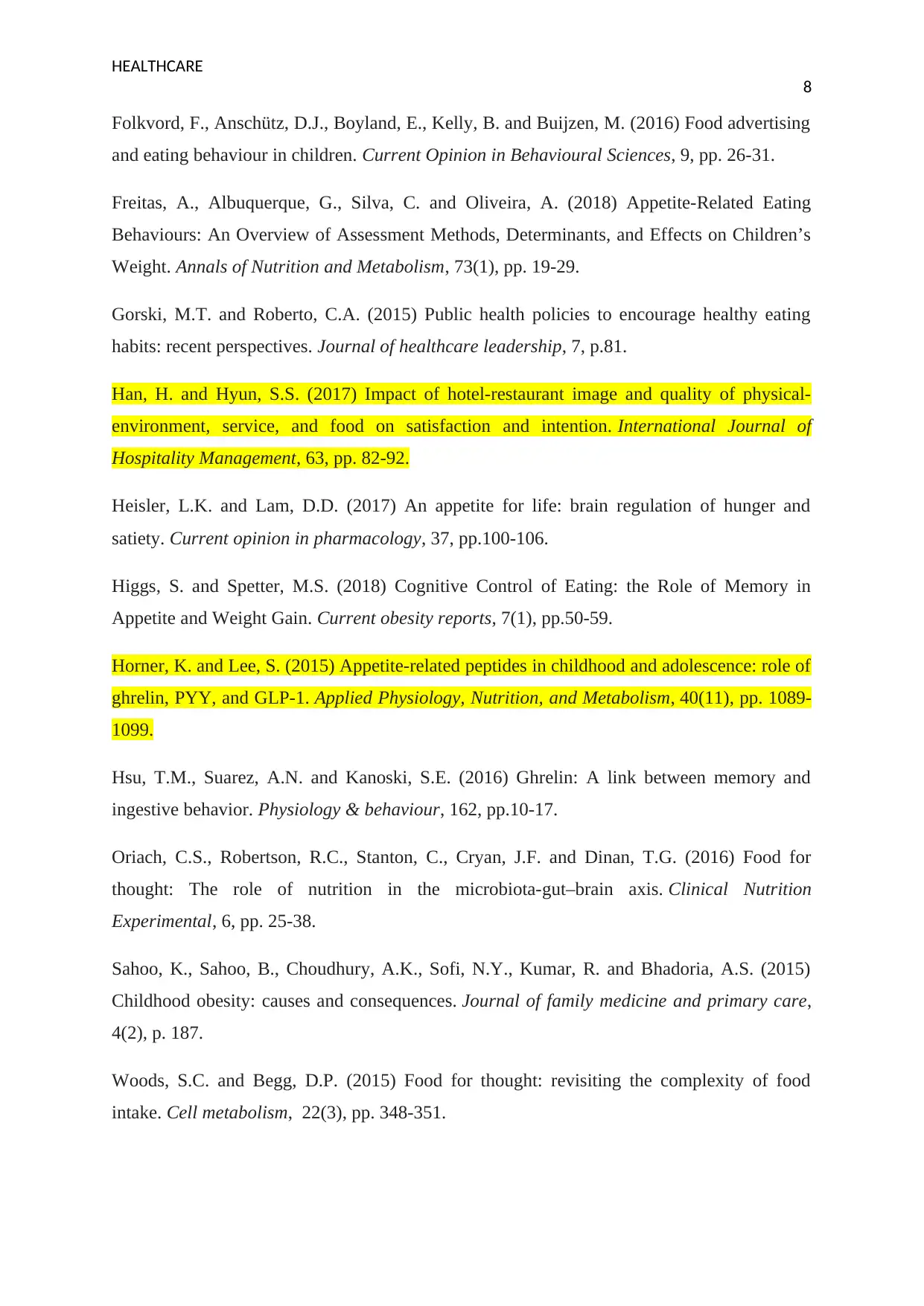
HEALTHCARE
8
Folkvord, F., Anschütz, D.J., Boyland, E., Kelly, B. and Buijzen, M. (2016) Food advertising
and eating behaviour in children. Current Opinion in Behavioural Sciences, 9, pp. 26-31.
Freitas, A., Albuquerque, G., Silva, C. and Oliveira, A. (2018) Appetite-Related Eating
Behaviours: An Overview of Assessment Methods, Determinants, and Effects on Children’s
Weight. Annals of Nutrition and Metabolism, 73(1), pp. 19-29.
Gorski, M.T. and Roberto, C.A. (2015) Public health policies to encourage healthy eating
habits: recent perspectives. Journal of healthcare leadership, 7, p.81.
Han, H. and Hyun, S.S. (2017) Impact of hotel-restaurant image and quality of physical-
environment, service, and food on satisfaction and intention. International Journal of
Hospitality Management, 63, pp. 82-92.
Heisler, L.K. and Lam, D.D. (2017) An appetite for life: brain regulation of hunger and
satiety. Current opinion in pharmacology, 37, pp.100-106.
Higgs, S. and Spetter, M.S. (2018) Cognitive Control of Eating: the Role of Memory in
Appetite and Weight Gain. Current obesity reports, 7(1), pp.50-59.
Horner, K. and Lee, S. (2015) Appetite-related peptides in childhood and adolescence: role of
ghrelin, PYY, and GLP-1. Applied Physiology, Nutrition, and Metabolism, 40(11), pp. 1089-
1099.
Hsu, T.M., Suarez, A.N. and Kanoski, S.E. (2016) Ghrelin: A link between memory and
ingestive behavior. Physiology & behaviour, 162, pp.10-17.
Oriach, C.S., Robertson, R.C., Stanton, C., Cryan, J.F. and Dinan, T.G. (2016) Food for
thought: The role of nutrition in the microbiota-gut–brain axis. Clinical Nutrition
Experimental, 6, pp. 25-38.
Sahoo, K., Sahoo, B., Choudhury, A.K., Sofi, N.Y., Kumar, R. and Bhadoria, A.S. (2015)
Childhood obesity: causes and consequences. Journal of family medicine and primary care,
4(2), p. 187.
Woods, S.C. and Begg, D.P. (2015) Food for thought: revisiting the complexity of food
intake. Cell metabolism, 22(3), pp. 348-351.
8
Folkvord, F., Anschütz, D.J., Boyland, E., Kelly, B. and Buijzen, M. (2016) Food advertising
and eating behaviour in children. Current Opinion in Behavioural Sciences, 9, pp. 26-31.
Freitas, A., Albuquerque, G., Silva, C. and Oliveira, A. (2018) Appetite-Related Eating
Behaviours: An Overview of Assessment Methods, Determinants, and Effects on Children’s
Weight. Annals of Nutrition and Metabolism, 73(1), pp. 19-29.
Gorski, M.T. and Roberto, C.A. (2015) Public health policies to encourage healthy eating
habits: recent perspectives. Journal of healthcare leadership, 7, p.81.
Han, H. and Hyun, S.S. (2017) Impact of hotel-restaurant image and quality of physical-
environment, service, and food on satisfaction and intention. International Journal of
Hospitality Management, 63, pp. 82-92.
Heisler, L.K. and Lam, D.D. (2017) An appetite for life: brain regulation of hunger and
satiety. Current opinion in pharmacology, 37, pp.100-106.
Higgs, S. and Spetter, M.S. (2018) Cognitive Control of Eating: the Role of Memory in
Appetite and Weight Gain. Current obesity reports, 7(1), pp.50-59.
Horner, K. and Lee, S. (2015) Appetite-related peptides in childhood and adolescence: role of
ghrelin, PYY, and GLP-1. Applied Physiology, Nutrition, and Metabolism, 40(11), pp. 1089-
1099.
Hsu, T.M., Suarez, A.N. and Kanoski, S.E. (2016) Ghrelin: A link between memory and
ingestive behavior. Physiology & behaviour, 162, pp.10-17.
Oriach, C.S., Robertson, R.C., Stanton, C., Cryan, J.F. and Dinan, T.G. (2016) Food for
thought: The role of nutrition in the microbiota-gut–brain axis. Clinical Nutrition
Experimental, 6, pp. 25-38.
Sahoo, K., Sahoo, B., Choudhury, A.K., Sofi, N.Y., Kumar, R. and Bhadoria, A.S. (2015)
Childhood obesity: causes and consequences. Journal of family medicine and primary care,
4(2), p. 187.
Woods, S.C. and Begg, D.P. (2015) Food for thought: revisiting the complexity of food
intake. Cell metabolism, 22(3), pp. 348-351.
⊘ This is a preview!⊘
Do you want full access?
Subscribe today to unlock all pages.

Trusted by 1+ million students worldwide
1 out of 9
Your All-in-One AI-Powered Toolkit for Academic Success.
+13062052269
info@desklib.com
Available 24*7 on WhatsApp / Email
![[object Object]](/_next/static/media/star-bottom.7253800d.svg)
Unlock your academic potential
Copyright © 2020–2026 A2Z Services. All Rights Reserved. Developed and managed by ZUCOL.

